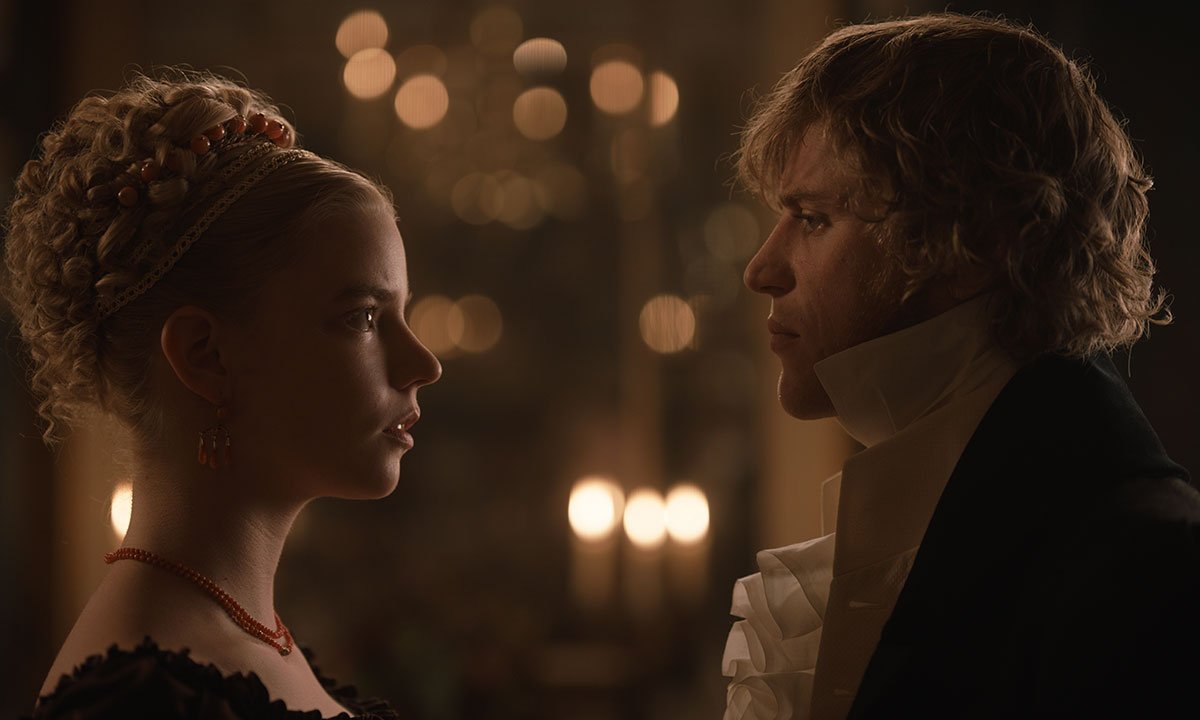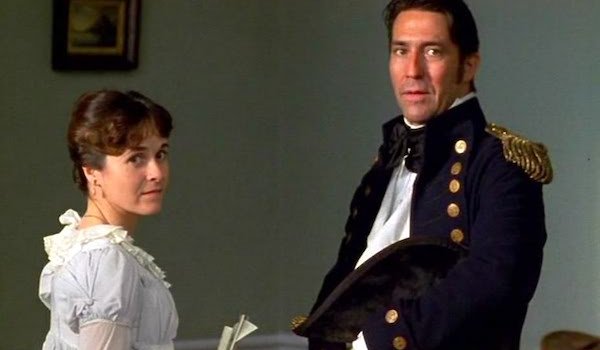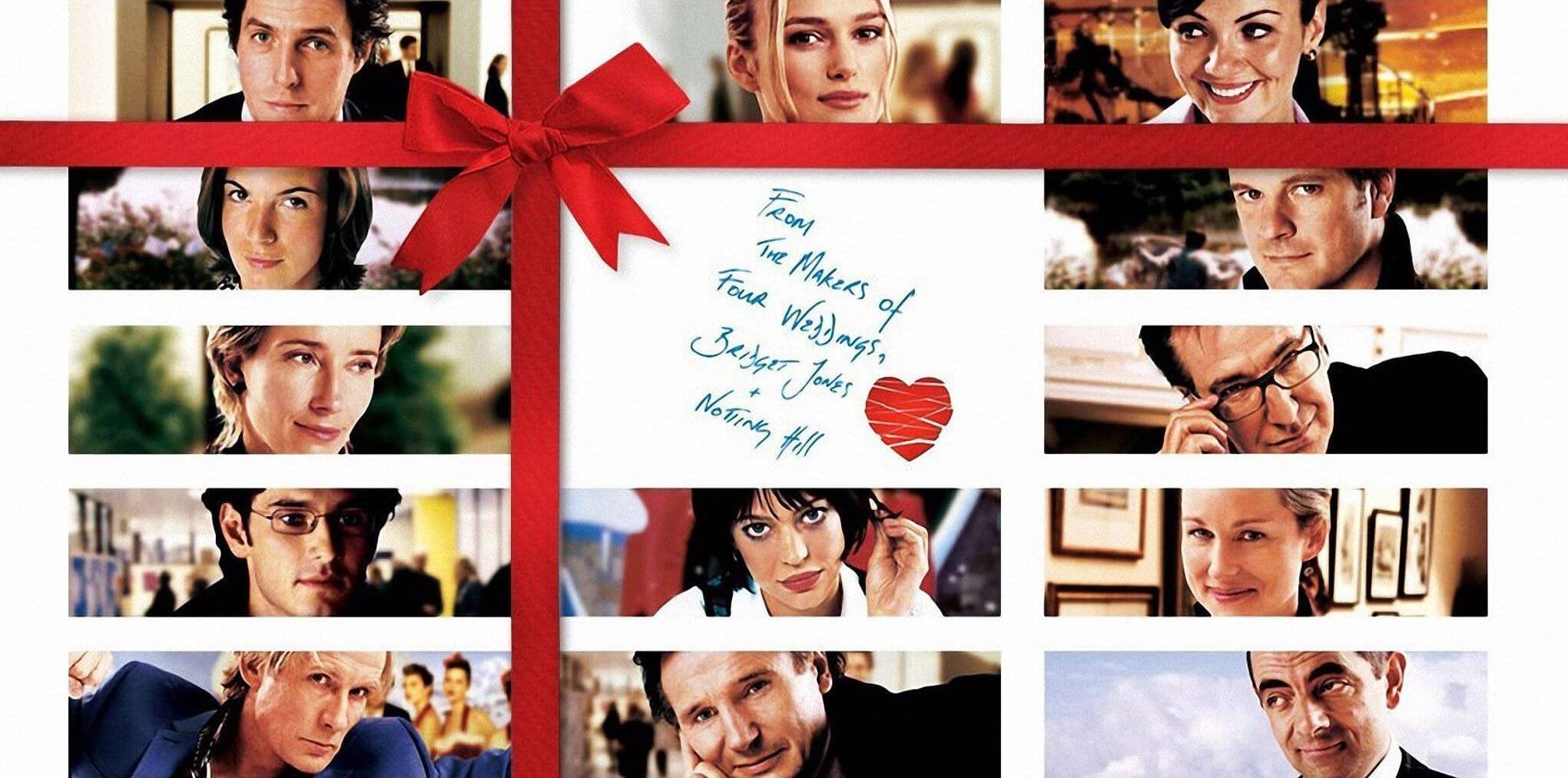The Semi-Comprehensive Jane Austen Adaptation Ranking
There are worse things you can do with your free time during a pandemic than watch Jane Austen adaptations obsessively. I will recount them as soon as I can think of them. In the meanwhile, I will provide a helpful ranking of all 15 post-90s Austen adaptations (anything before the 90s is not ideal for human enjoyment). I will progress from the worst adaptation to the best while pointing out the best and worst casting choices along with the most iconic moment and the low point of each adaptation. This ranking deals with direct adaptations so unfortunately modern reimaginings such as Clueless can’t be found here.
Beware: this listicle contains not only spoilers from 200-year-old novels, but also highly subjective opinions.
15. Persuasion (2007 film)
Rupert Penry-Jones as Captain Frederick Wentworth and Sally Hawkins as Anne Elliot
The distinction between a found footage horror film and an adaptation of a Jane Austen novel is rather murky with this one. The shaky camera and gray-bright lighting certainly makes me feel unsettled—like worms are about to start crawling out of someone’s mouth at any moment. At the very least this is a slasher film for what it did to the source material. Behold, 90 minutes of competition about which can depress me more, the pallid characters in pallid lighting miserably delivering their lines or the director’s fervent passion for skipping every moment from the novel that matters and replacing them with scenes where the characters tell exactly what they feel to the camera.
Best casting: Sally Hawkins as Anne does her best with the material she is given.
Worst casting: Rupert Penry-Jones, playing the charming naval captain Wentworth delivers each of his lines with the passion of someone with a shotgun pressed to their temple lest they smile.
Most iconic moment: The end credits.
Low point: Let me paint you a picture: Anne is jogging around Bath with her invalid friend who delivers exposition to the audience in a manner that is only slightly more elegant than a news banner running in the bottom of the screen relaying the same information, followed shortly by her receiving a letter whose significance has been shredded much like my will to live while watching this film. She jogs around some more before the film culminates in an absurdly awkward kiss (as one can expect when one party has just run a marathon and the other one feels so disinterested that he does not even bother to lean down).
14. Emma (1996 film starring Gwyneth Paltrow)
Gwyneth Paltrow as Emma Woodhouse and Toni Collette as Harriet Smith
I have never liked this adaptation. It is a pain to watch not only because of the lighting budget that seems to consist of a flashlight glued to the ceiling with a piece of gum, but because the story seems so shallow. The film desperately wants to be just a fun, romantic tale and is so afraid of portraying the leading lady as an asshole that it has the exact opposite effect on the viewer — no other adaptation makes you want to plaster Emma’s face on a dart board quite as much.
Best casting: Alan Cumming is so delightful as Mr. Elton that he is able to somewhat stir you from the coma the first 20 minutes of this film has put you in.
Worst casting: Gwyneth Paltrow plays Emma completely straight. There is no irony or cheekiness to her portrayal which is desperately needed with this character, just the conviction that she is playing a likable, misunderstood heroine. The aura of the actress also has the side effect of inspiring fear in the viewer that Emma will suddenly turn to the camera to sell them jade eggs for questionable purposes.
Most iconic moment: The love confession/proposal scene is way too cheesy for my tastes, but at least it signifies the film is near its end.
Low point: Every scene where they try to character assassinate Harriet. What has this poor girl done to them to be portrayed in this way?
13. Emma (1996 film starring Kate Beckinsale)
Kate Beckinsale as Emma Woodhouse and Mark Strong as George Knightley
This adaptation can only be described with one word: unpleasant. Emma is portrayed as a chill-inducing villain, Knightley has never been more patronizing, and the film is littered with shots of servants suffering to provide the genteel class with their frivolous joys. Either this atmosphere was highly unintentional, or the director knew exactly what he was doing and used this adaptation as means of Marxist class critique. Witnessing such genius is frightening…
Alright, it is probably the former explanation. Still makes the adaptation a bit more interesting to watch than the aforementioned.
Best casting: Raymond Coulthard’s portrayal of Frank Churchill as a vampire/serial killer that cannot stop smiling creepily or commenting on Jane Fairfax’s skin and supple neck is a bold but intriguing choice.
Worst casting: Mark Strong is a great actor, but his receding hairline draws the attention to the age difference between him and Emma like a hammer to the face. But perhaps that is the point. Who knows.
Most iconic moment: The poor servants having to lay down a pillow on the ground before any of the gentlefolk are willing to crouch down to pick up a single strawberry.
Low point: Knightley telling Emma he held her in his arms when she was mere weeks old just after she has accepted his proposal. Yikes.
12. Sanditon (2019 series)
Theo James as Sidney Parker, Rose Williams as Charlotte Heywood, Crystal Clarke as Georgiana Lambe, Anne Reid as Lady Denham and Kris Marshall as Tom Parker
Sanditon is like a moldy piece of bread. On one side, it looks somewhat delicious, but when you turn it over, you spot the assortment of fungi that has taken over. It is your choice whether to cut it out and still eat the thing, but I am not sure that even if you removed the personification of mold, Mr. Sidney Parker, the show would be able to convince me to leave my heart in this struggling seaside resort. Perhaps if Austen had ever finished this fragment of a novel, I would have more reason to care.
Best casting: Charlotte Spencer and Lily Sacofsy as Esther Denham and Clara Brereton kept me entertained with their turf war throughout the series, unlike much else.
Worst casting: In the novel, Sidney Parker is an amiable young man who finds humor in everything. Theo James’ Sidney Parker, on the other hand, seems to have been intended as a second rate Darcy, though he resembles far more some of Austen’s male villains — Willoughby, Wickham, Crawford and the like. Actually, scratch that. All three I mentioned above have the capacity to charm others. Sidney Parker is just a cad who spends most of his time negging the protagonist Charlotte when he is not yelling at her or the other women in his life.
Most iconic moment: After writing Pride and Prejudice, Andrew Davies seems to have decided to make each of his subsequent Austen adaptations gradually sexier and edgier. This culminates in Sandition where we see our first pseudo-incestual sex scene on a drawing room floor. I’m choosing to mention it in this category since it… certainly sticks to your mind.
Low point: Ah, so many of Sidney Parker’s angry lashouts to choose from! Perhaps I will go with the one from the very first episode: Sidney responds to Charlotte’s innocent remarks about his brothers with a highly sexist rant to her face. As one did back when 4chan did not exist yet.
11. Sense & Sensibility (2008 miniseries)
Hattie Morahan as Elinor Dashwood and Dan Stevens as Edward Ferrars
What is there to say about this adaptation? It is certainly faithful to the novel and does its best to make the story engaging, but everything seems more awkward and less polished than in the far superior 1995 adaptation. Here too, you can see the marks of Andrew Davies’ new, sexed up adaptation style right from the beginning — for some reason, the series attempts to hook audiences in by opening with Willoughby’s impregnation of a 15-year-old.
Best casting: Daisy Haggard does an amazing job as the aggravatingly chatty Anne Steele.
Worst casting: I am not sure why I am expected to buy that the dashing, ridiculously good-looking Dan Stevens is playing a character that is supposed to be the shy and reserved clergyman-to-be Edward. No wonder Lucy Steele is hanging onto him with nail and tooth.
Most iconic moment: Edward Ferrars chopping down wood without a shirt. Both the most unnecessary and necessary scene in the whole adaptation.
Low point: One doesn’t know whether to laugh or cry at the way Colonel Brandon and Willoughby’s sword fight is edited.
10. Mansfield Park (2007 film)
Blake Ritson as Edmund Bertram and Billie Piper as Fanny Price
It is hard to find a person whose favorite Austen novel is Mansfield Park. The novel is significantly darker in tone than the rest of her works and leaves an odd taste in your mouth after reading it. This adaptation attempts to rectify this by making it as pleasant as possible, even glossing over a plot point as huge as Fanny returning to her birth home in Portsmouth and seeing the miserable state of her family. The end result is a rather odd but serviceable story of a plucky girl who surpasses some minor inconveniences and finds her happy ending… with her cousin.
Best casting: I rather like this adaptation’s Edmund, played by Blake Ritson. He has the same awkward energy as Hugh Grant’s Edmund Ferrars, making him more likable than in the novel.
Worst casting: As much as I love the actress, there is nothing even remotely Fanny Price-like in Billie Piper.
Most iconic moment: The confrontation scene between Edmund and Mary Crawford is delicious and well done. In addition, Edmund chasing down Fanny to kiss her is actually quite sweet. Makes me almost forget they are first cousins.
Low point: Fanny’s voice-over narration in the beginning. Completely unnecessary and hardly ever used again after that point.
9. Mansfield Park (1999 film)
Embeth Davidzt as Mary Crawford, Frances O’Connor as Fanny Price and (in the background) Jonny Lee Miller as Edmund Bertram
Some have called Mansfield Park unadaptable because of the protagonist's lack of involvement with the plot and general unlikability. This adaptation chooses to solve this by throwing Fanny Price’s personality into the dumpster altogether and replacing her with a stand-in for the author, Jane Austen herself. This change certainly makes for a bit more entertaining story, but I have to wonder whether this darker-toned film might still have been better served with a protagonist who quietly observes and judges her slave-owning relatives.
Best casting: Embeth Davidzt nails the role of Mary Crawford, making me fall a little bit in love with her along with Edmund. As good as Hayley Atwell was in the role in the adaptation listed just before, she seemed a hint too cold and calculating for Edmund’s adoration for her to seem believable.
Worst casting: Sheila Gish is unfortunately unable to make Mrs. Norris as hateable as she is in the novel. Then again, I have yet to see a perfect casting for this role.
Most iconic moment: Mary Crawford practicing her lines for the play with Fanny. The homoerotic tension is through the roof.
Low point: Mr. Rushworth bringing a reporter to Mansfield Park just as his wife has committed adultery is too farcical of a coincidence, better served for a comedy than a film like this.
8. Northanger Abbey (2007 film)
J.J. Feild as Henry Tilney and Felicity Jones as Catherine Morland
One of the most hilarious of Austen’s novels but hard to adapt as much of the humor relies on the satire of gothic romances of the time. The film is not quite able to capture the magic of the novel, but is able to serve us with a fun tale of a girl with a tad too active of an imagination trying to navigate the social circles of Bath.
Best casting: J. J. Feild as Henry Tilney is ridiculously charming. As he should be. Carey Mulligan as devious Isabella Thorpe also deserves a mention.
Worst casting: There is none! Every character is shockingly well realized on the screen.
Most iconic moment: Every scene where Catherine’s imagination takes a hold of her. From highway robberies to erotic baths, these daydreams always make me chuckle.
Low point: The ending is jarringly abrupt. It is faithful to the novel, but that doesn’t mean something else couldn’t be tried.
7. Love & Friendship (2016 film)
Kate Beckinsale as Lady Susan Vernon
Lady Susan is a secret favorite of mine. The story is very simplistic, but damn if it isn’t funny for someone who appreciates a good, humorous villain. It is also wonderful how much of Austen’s writing was retained in the dialogue. Her wit shines through in every scene.
Best casting: Kate Beckinsale has so much fun in this role it is hard not to have fun with her. Tom Bennett as Sir James is also absolutely hilarious.
Worst casting: Stephen Fry, simply for the fact that he was criminally underutilized as Mr. Johnson whose role in the story is extremely marginal.
Most iconic moment: When it is revealed that Lord Manwaring is Susan and her new husband’s houseguest. It draws a startled laugh out of the viewer. Looks like this cunning lady got everything she wanted, after all.
Low point: The short, strange snippets where they introduce new characters more so confuse the viewer than help them remember all the key players.
6. Pride and Prejudice (2005 film)
Keira Knightley as Elizabeth Bennet and Matthew Macfadyen as Fitzwilliam Darcy
If you can overlook the fact that the director Joe Wright treats historical accuracy and faithfulness to Austen’s novel like a bowl of M&Ms he can pick and choose his favorite colors from, you have a good time ahead of you. The film is visually rich and overflows with romance, making it the perfect thing to put on when you are feeling fanciful.
Best casting: Matthew Macfadyen’s portrayal of Mr. Darcy feeds into the misconception that the character’s primal sin is his social awkwardness when in the novel, he is the biggest stuck-up snob there is, but I cannot help but still enjoy his performance even if I wish he was a bit more in need of that redemption arc his character is famous for. He comes closest to the ideal portrayal of the character that is in my head which no one has yet to accomplish.
Worst casting: Tom Hollander as Mr. Collins is so awkward that you cannot help but feel bad for him — and I am not entirely sure if I want to feel bad for Mr. Collins.
Most iconic moment: Most would mention Darcy’s unforgettable hand flex after touching Elizabeth here, but I have to shine a light on the way Bingley lightly catches the material of Jane’s gown between his fingers while walking behind her. This is what Austenian romance is all about!
Low point: Any scene in the Bennet family home, especially if there are animals involved. Joe Wright seems to think that a family belonging to landed gentry who earns even one cent less than 5 000 a year is living in a sort of meager cottagecore-esque existence with pigs, dogs and chicken wandering around their household, the existence of their servants dubious.
5. Emma (2020 film)
Anya Taylor-Joy as Emma Woodhouse and Johnny Flynn as George Knightley
Autumn de Wilde’s 2020 adaptation truly is a refreshing take of the novel as some actual care has been put into realizing the titular character’s development. Besides that, Emma’s world is a pastel candyland that is a joy to watch, and the humor is there, though it doesn’t lean on the wonderful wit of the novel as much as I would like.
Best casting: Mia Goth doesn’t fall into the common trap of portraying Harriet Smith as a complete airhead. For the first time, the character is given some actual depth. Seeing her call out Emma on her manipulation is soup for the soul.
Worst casting: Bill Nighy’s surprisingly springy and energetic portrayal of hypochondriac Mr. Woodhouse is one I find difficulty forming an opinion about.
Most iconic moment: There is something deeply hilarious about Mr. “I should like to see Emma in love and in some doubt of a return. It would do her good” Knightley ripping off his coat and dropping down to the floor of his magnificent parlor because he is unable to process his feelings for the girl. Oh, the irony!
Low point: For some inexplicable reason, John and Isabella’s marriage is portrayed as one of those heterosexual death traps that is more uncomfortable than amusing to watch.
4. Pride and Prejudice (1995 miniseries)
Colin Firth as Fitzwilliam Darcy and Jennifer Ehle as Elizabeth Bennet
The horror! The iconic BBC adaptation of Pride and Prejudice that launched the Jane Austen renaissance is only in fourth place! If you’d kindly let me down from this burning stake, I will explain myself: as much as I adore this adaptation, my love for the next three titles is so great that even Pride and Prejudice falls short.
(I was never that big of a Darcy girl, anyway. I would have loved to see him grovel just a bit more.)
Best casting: Colin Firth is the most authentic Darcy there is. His haughtiness and pomposity makes me want to slam dunk his ass into the nearest gutter as badly as Elizabeth does.
Worst casting: Colin Firth, also. Hear me out. As great as his performance was, I cannot help but wonder whether it might have been improved by someone better able to portray Darcy as both hateable and lovable at the same time. There is a certain vulnerability I am missing that makes his redemption not seem fully believable.
Most iconic moment: Elizabeth’s rejection of Darcy’s proposal is cinematic poetry. If I had been verbally obliterated like that, I would have burned my face off with acid and left the country.
Low point: Not as much of a low point than a point of hilarity caused by 90s visual effects. I can never get tired of Darcy’s floating face that occasionally pops on the screen to haunt Elizabeth like her very own bodiless poltergeist.
3. Emma (2009 miniseries)
Romola Garai as Emma Woodhouse
The best adaptation of Emma as of yet. The miniseries shows the same adoration for the titular character as Austen herself without losing the wit of the novel — the story’s romantic entanglements are examined through the same ironic lenses. Just the gorgeous opening theme gets you smiling and excited for the matchmaking antics you are about to witness.
Best casting: Romola Garai as Emma, hands down. This might just be the best casting I have ever seen in an Austen adaptation. Making a character like Emma seem not only likable but an extremely sympathetic and heart-tugging protagonist without shying away from her jackassery is the kind of black magic I wouldn’t want to mess with.
Worst casting: The whole cast is perfect, though I would have loved to see a hint more depth from Louise Dylan as Harriet Smith.
Most iconic moment: Knightley’s proposal to Emma is heartbreakingly sweet and the highlight of the whole series. If I loved the scene less, I would be able to talk about it more.
Low point: The series being so rude as to end.
2. Sense & Sensibility (1995 film)
Kate Winslet as Marianne Dashwood and Alan Rickman as Colonel Brandon
What else could take second place but the 1995 adaptation of Sense & Sensibility whose masterful screenplay was penned by none other than Dame Emma Thompson herself? The wit, the romance, the emotion is all there. There is not a scene that doesn’t make me point my finger at the screen, saying “Yes! This is how you do Austen right!”
Best casting: No one will ever embody the sweet-natured, passionate Colonel Brandon better than Alan Rickman. Ever.
Worst casting. Absolutely no one. Everyone gives their all to their roles, elevating this adaptation to a level the titles listed before couldn’t quite achieve.
Most iconic moment: I must mention two —The hilarious moment when poor Lucy Steele reveals to Fanny Dashwood who is her betrothed, and the explosion of the emotions Elinor has been stifling for so long when Edward finally proposes.
Low point: Are there any?
An Austen adaptation cannot get better than this. And yet, it is only in second place. Objective perfection is still not quite able to make this one my ultimate favorite Austen adaptation of all time. That title can only belong to the adaptation listed right below.
1. Persuasion (1995 film)
Amanda Root as Anne Elliot and Ciarán Hinds as Captain Frederick Wentworth
Watching this adaptation is like a hearth at the end of a long, cold winter’s day. Maybe I am biased as this is my favorite novel of Austen, but the sheer warmth and gentleness of the way this story is adapted leaves me feeling like someone has bundled me up in a soft, fuzzy blanket. Despite this being one of her more melancholic stories, when the end credits roll, you feel exactly as Austen intended — full of hope and happiness.
Best casting: Nearly everyone deserves this merit. Ciarán Hinds is utterly swoonworthy as Captain Wentworth, Amanda Root captures Anne’s essence like no one else, Sophie Thompson is a riot as Mary Musgrove, and the Crofts will always be Fiona Shaw and John Woodvine in my mind.
Worst casting: Phoebe Nicholls’ Elizabeth Elliot resembles her novel counterpart very little. This is the single fault of the film in my eyes.
Most iconic moment: The most iconic moment starts from the very first seconds of the film and goes on until the end credits. Highlights of this moment include the hilarious introduction of Mary Musgrove, Wentworth noticing Anne is tired and gently helping her into the Crofts’ carriage, Wentworth praising Anne behind her back, Sir Walter’s comical snobbery, Wentworth leaving the concert in a fit of jealousy, the sublime pain on Wentworth’s face as he is forced to ask whether Anne plans to marry Mr. Elliot, and finally — the letter scene. Every second of it is pure perfection, and I cannot do it justice by describing it.
Low point: The fact that I cannot inject this film directly into my veins. Yet.



















